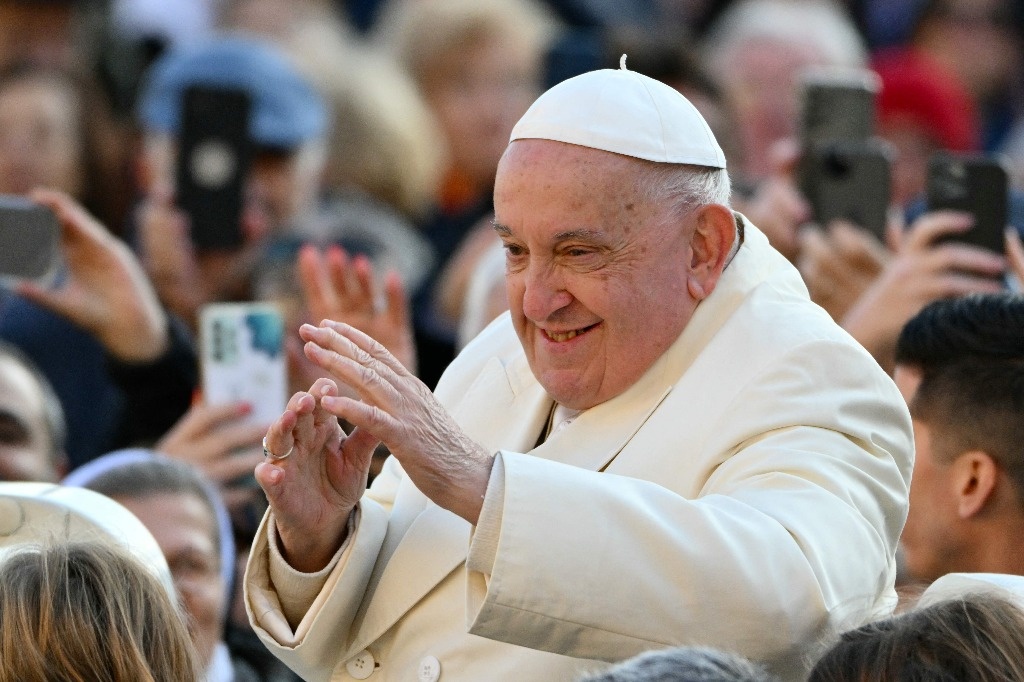Vatican City. Pope Francis received at the Vatican on Thursday 16 Israelis who were held hostage in Gaza for months by the Islamist movement Hamas, the official news website Vaticannews reported.
In the group there were ten women, four men and two children, according to the same source.
Several of the former hostages showed the Argentine pontiff banners or photos of their loved ones who remain captive.
Francisco already received relatives of hostages in April of this year and in November 2023, but this is the first time he met with people who suffered captivity firsthand.
Since the conflict between Israel and Hamas began, the pope has demanded on numerous occasions the immediate release of the Israeli hostages, but he also denounced the suffering of the Palestinian population.
The war broke out on October 7, 2023, when Islamist militants attacked southern Israel and killed 1,206 people, mostly civilians, and kidnapped 251, according to an AFP report based on official Israeli figures that include hostages killed in captivity.
Of those kidnapped, 97 remain captive in Gaza, but the Israeli army estimates that 34 of them died.
The military offensive launched in response by Israel has killed at least 43,736 people in the Gaza Strip, mostly civilians, according to data from the Hamas-ruled territory’s Ministry of Health.
!function(f,b,e,v,n,t,s)
{if(f.fbq)return;n=f.fbq=function(){n.callMethod?
n.callMethod.apply(n,arguments):n.queue.push(arguments)};
if(!f._fbq)f._fbq=n;n.push=n;n.loaded=!0;n.version=’2.0′;
n.queue=[];t=b.createElement(e);t.async=!0;
t.src=v;s=b.getElementsByTagName(e)[0];
s.parentNode.insertBefore(t,s)}(window, document,’script’,
‘
fbq(‘init’, ‘133913093805922’);
fbq(‘track’, ‘PageView’);
fbq(‘track’, ‘Contact’);
fbq(‘track’, ‘Donate’);
fbq(‘track’, ‘FindLocation’);
fbq(‘track’, ‘Lead’);
fbq(‘track’, ‘Search’);
fbq(‘track’, ‘Subscribe’, {value: ‘0.00’, currency: ‘MXN’, predicted_ltv: ‘0.00’});
fbq(‘track’, ‘ViewContent’);
#Pope #Francis #receives #Hamas #hostages
–
**How might the Pope’s emphasis on humanitarian concerns during his meeting with the former hostages influence the political discourse surrounding the Israeli-Palestinian conflict?**
## Interview: Pope Francis Meets with Former Hamas Hostages
**Host**: Welcome back to World Today News. We are honored to be joined today by two distinguished guests to discuss a profoundly moving event: Pope Francis’s meeting with former hostages recently released from captivity in Gaza.
Joining us are Professor Anya Cohen, a renowned expert on Middle Eastern geopolitics and conflict resolution, and Mr. David Levi, a journalist who has extensively covered the Israeli-Palestinian conflict.
Welcome to both of you.
**Professor Cohen**: Thank you for having me.
**Mr. Levi**: It’s good to be here.
**Host**: Let’s begin by addressing the humanitarian crisis at the heart of this story. Professor Cohen, Pope Francis’s meeting with those who endured captivity is a powerful symbolic gesture. How do you view the significance of this event in the context of the ongoing conflict?
**Professor Cohen**: This meeting carries immense symbolic weight. It highlights the human cost of this conflict, reminding the world that beyond political agendas and military strategies, there are individuals – men, women, and children – whose lives have been irrevocably altered by this violence.
The Pope’s message of compassion and solidarity resonates deeply, especially considering his past calls for the immediate release of all hostages and his acknowledgement of the suffering on both sides.
**Host**: Mr. Levi, you’ve been on the ground covering this conflict for years. How do you think this meeting will be perceived in Israel and Gaza?
**Mr. Levi**: In Israel, the public will likely view it as a positive step. The release of any hostages is cause for celebration, and the Pope’s meeting with them will be seen as a gesture of support for their ordeal. However, some may criticize the meeting for not mentioning the ongoing Hamas rocket attacks on Israel.
In Gaza, the reaction will likely be more complex. While there may be a sense of relief that some hostages have been freed, there could also be anger and resentment over the perceived lack of attention to the suffering of Palestinians under the Israeli blockade and ongoing bombing campaign.
**Host**: Let’s shift our focus to the larger geopolitical landscape. Professor Cohen, what implications, if any, does this meeting have for potential future peace negotiations?
**Professor Cohen**: It’s important to remember that this one meeting, however significant, will not single-handedly resolve the decades-long conflict. However, it could potentially create a space for dialogue and renewed efforts towards peace.
The Pope’s meeting highlights the urgent need for a ceasefire and the resumption of negotiations aimed at a just and lasting solution. His moral authority and global influence can help bring warring parties back to the negotiating table and encourage compromise.
**Host**: Mr. Levi, do you share this view? What concrete steps could be taken to build on this momentum for peace?
**Mr. Levi:** I believe this meeting could be a catalyst for positive change. It reminds us that there are shared human experiences and a shared desire for peace on both sides.
Concrete steps would include:
* **An immediate ceasefire:** A cessation of hostilities is crucial to allow for dialogue and humanitarian aid to reach those in need.
* **International pressure:** The international community must continue to exert pressure on both sides to engage in meaningful negotiations.
* **Addressing root causes:** A long-term solution requires addressing the underlying issues fueling the conflict, including Palestinian statehood, Israeli security concerns, and the humanitarian crisis in Gaza.
**Host**: Professor Cohen and Mr. Levi, thank you both for your insightful perspectives on this complex and deeply affecting situation.
We have focused today on the immediate impact and potential future implications of Pope Francis’s meeting with former Hamas hostages. As the conflict in the Middle East continues to unfold, these conversations will remain crucial in our efforts to understand the human cost of war and the potential pathways toward a more peaceful future.
